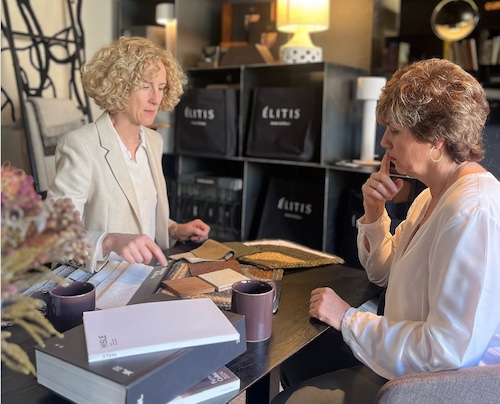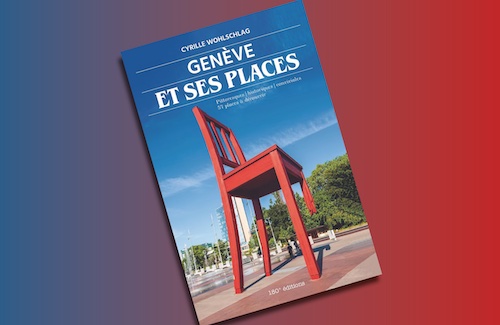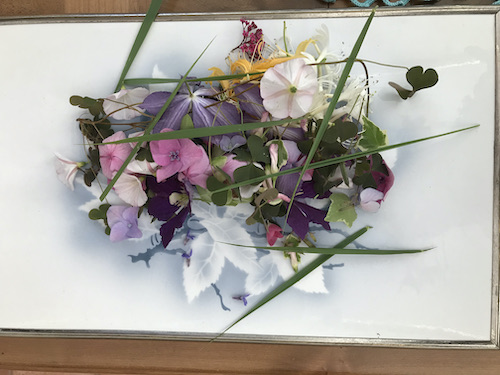
Last year we presented Maison Casagiu, made up of 4 different independant companies. Now we would like to introduce Giselle, an independent interior architect and founder of GEM Design Studio.
Originally from South Africa, she spent the first 30 years of her life living in close proximity to the Kruger National Park. She married a Swiss-Italian, but before settling in Switzerland they spent a few years in the United States.
She studied and worked in the field of industrial psychology, but always had a passion for finding the most functional layouts for spaces. After testing the water with a decorating course with KLC School of Design in London, she completed her certificate in interior architecture with the Swiss Design Center in Lausanne.
She is a firm believer the home should be a soothing and harmonious place, where her clients and their families can work, play and unwind. She particularly focuses on functional spaces, that are able to evolve with the changing needs of the client and the individual family members. Without being a slave to trends, her objective is to bring originality and richness to each project, not only with the choice of furnishings, lighting and art, but also with the use of a natural palette of materials and textures.

Genève et ses places, a recent book by Cyrille Wohlschlag, was published in December 2024. We asked 180º éditions about their latest publication and they have offered one copy to one of our readers in the competition below!
Not only is the book of 112 pages extremely picturesque, but you will find out about the historic value of each of these 57 places in Geneva!
Right away, let's set the scene! If you can't stand still, if you can't stand standing still, if you like to wander from square to square, then this book is for you.
As you can see, this book takes you on a voyage of discovery through Geneva's squares, spiralling from the center to the periphery, from the city to the countryside.
So, ladies and gentlemen, take your seats! Place du marché, place de la gare, place de l'église, it's the center of the neighborhood, the place to meet, to socialize, to live.
A square is wherever there's space, it's the place to be. Sometimes they're called rond-point, esplanade, square, courtyard and, in Geneva, there's even a plateau, a perron and above all a plaine, as well as a rondeau, which is in Carouge.

As soon as I saw Swiss Accent, I sent my congratulations about this jewelry with a Swiss touch to Mathilde! Not only will our English-speaking readers who live in the Lake Geneva area appreciate finding out more about this, but so will anyone who loves and supports Swiss images.
Between the Swiss flag or outline of Switzerland (SwissMap), you can also choose a key (representing Geneva) or go with an all-purpose cheese fondue symbol! These are very easy to send through the mail to your families overseas as well! Mathilde and Romain are offering a discount on any purchases made through Christmas, read below.
What has been the inspiration?
Swiss Accent was born out of a deep love for Switzerland and the beauty of its heritage. Romain, my partner, initially created the GenevaKey and SwissFlag bracelets as symbols of Swiss pride. Then, in early 2024, we decided to revive these iconic pieces together and add two new designs: SwissMap and SwissFondue. Our goal was to capture the essence of Switzerland in unique, stylish jewelry that people could carry with them every day.
Romain and I are both Swiss and currently live in Geneva. We also both have dual nationalities: Romain is Canadian, and I am French. Additionally, we are married, which makes this adventure even more special for us!

Lisa's flower mandala cushions will be on sale this weekend as well as other items
With all the holiday markets leading up to Christmas, it is hard to know which one to attend. You will surely find what you are looking for at any of them ranging from decorative items, handmade greeting cards, jams, cookies, clothing, knitted or crocheted items, stained glass, and candles. Have a look at our Events Calendar to see other markets.
Lisa Cirieco-Ohlman, author of Know-it-all passport®, and teacher of all creative things at Coffee and Creations, will be participating in only one market this year. It will be the Marché de Noël de Bellevue, just outside of Geneva.


Ariel Pierre Haemmerlé with the newly published book
Back in 2021 we wrote an article about Ariel-Pierre Haemmerlé at this link, the tour guide with a big personality. This lovely man has just published his seventh book! Check out another article in 2022 about his fifth book at this link. We met up with him again to find out more and get our hands on a copy of Geneva, a Voyage through its History... laced with a detective story.
This is an updated and completed version of the book “Genève et la tentative d'assassinat de la chancelière”, of which the 2nd edition was published in 2019 – and has been translated into English by the author himself.
In 14 chapters over 300 pages, this book takes you on a guided tour through the historical sites of the City and Canton of Geneva. As the author, Ariel Pierre Haemmerlé, is a professional tour guide for the city, he has been able to pass along his knowledge and integrate it into the storyline. In an entertaining way, the book tells how Geneva has become that City of Peace we cherish today with its history of 15’000 years.
To add another dimension to the story, a fictional attempted assassination of the Chancellor mixes into a routine tour one day, and all the tribulations that follow.
An excellent overview on the history of the protestant Reformation with Calvin and John Knox, a great number of events threads itself through the book. It’s the only book available in English on the fabulously rich history of Geneva.








